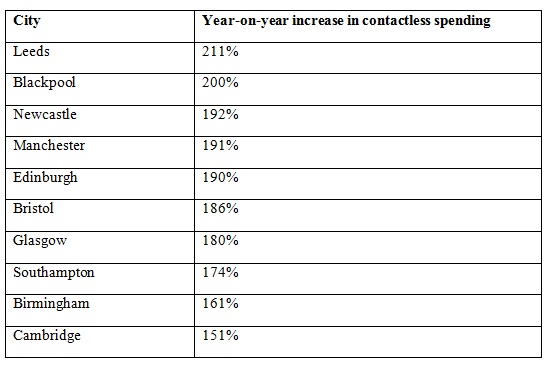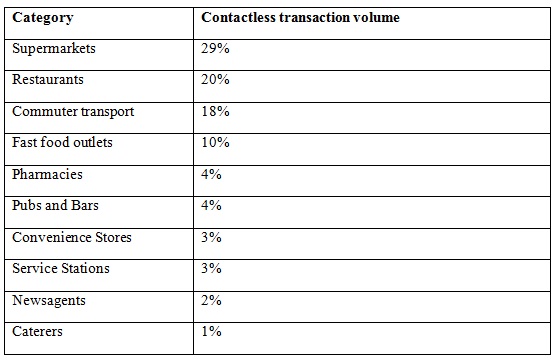As spending limit on Apple Pay increases from £20 to £30 new data shows sharp rise in contactless payments.
Data released by Barclaycard today shows that contactless spending has more than trebled in the last 12 months.
Barclaycard, which processes nearly half of all credit and debit card transactions in the UK*, saw the amount consumers spent using contactless payments soar 150 percent, with the number of transactions rising 134 per cent.
Key findings:
• Year-on-year contactless spending has leapt 150 per cent by value and 134 per cent by volume
• 57 per cent of Brits expect to increase contactless usage now that the contactless limit is set to rise from £20 to £30 per transaction
• Regionally, Leeds is seeing the largest growth in contactless spending, higher than any other UK city
• Women are catching up with men, with 45 per cent of transactions now made by females compared to 36 per cent at the end of 2014
The figures come as the maximum amount which can be spent on contactless cards and mobile devices in a single transaction increases from £20 to £30. This starts to roll-out across the UK from 1stSeptember.
Barclaycard figures also show that almost six in 10 shoppers (57 per cent)** intend to take advantage of the limit increase to £30 by upping their contactless usage, suggesting that the speed and convenience of ‘touch and go’ payments is becoming increasingly popular among consumers.
Across the country women are closing the gap on men when it comes to contactless adoption, with females now accounting for 45 per cent of active customers compared to 36 per cent at the end of 2014. In addition, 50 per cent of contactless users are now aged 50 or over, with 20 per cent aged 65 plus, indicating that this technology is being embraced by all consumers regardless of gender or age.
The national picture
Across the UK, Leeds has seen the biggest increase in contactless usage, with the city’s residents spending 211 per cent more this year compared to last. Also seeing big leaps in contactless spending are Blackpool (200 per cent), Newcastle (192 per cent), Manchester (191 per cent) and Edinburgh (190 per cent). Contactless spending across the UK is expected to maintain rapid levels of growth as a number of businesses outside of London increasingly adopt the technology.

Overall, London continues to lead the way for contactless penetration with 40 per cent of eligible transactions made contactlessly, up from three in ten in 2014. This continued rise is largely accounted for by the increase in popularity of contactless travel on London’s tubes, trains and buses. Last year Barclaycard was a key partner in TfL’s roll out of contactless travel throughout London, which has now seen more than 150 million journeys since its launch September 2014.
Where we’re spending
Supermarkets receive the lion’s share of contactless spend, accounting for almost a third of all transactions (29 per cent)***. According to Barclaycard data, the average supermarket shop is £23, meaning that many more shoppers will now be able to benefit from the ease and speed of contactless when buying groceries.

Restaurants generate the second highest number of contactless transactions at 20 per cent, and Barclaycard’s July Spend data also shows that consumers are eating and drinking out more than they were 12 months ago, with year-on-year spending rising 13.6 per cent****.
Yet, alongside this, we’re also spending less each time we eat out, with the average amount spent falling -5.6%. These trends indicate that consumers will not only be more likely to use contactless to pay when they dine in restaurants – as the limit increase will cover a higher spend – but are also set to use it more often given the increased frequency of restaurant visits.
The continued growth in contactless usage underlines Barclaycard’s leading role in developing and progressing the technology, having introduced it into the UK in 2007 and remaining at the forefront of its ongoing rollout to consumers and retailers ever since.
In June Barclaycard expanded its range of bPay wearable devices, unveiling a new wristband as well as a fob and a sticker, which can be used to make contactless payments at more than 300,000 terminals across the UK. And during the busy Christmas shopping period last year, Barclaycard also trialled contactless payment gloves, enabling shoppers to ‘touch and go’ by waving their hand in front of a contactless point of sale.
Tami Hargreaves, Head of Contactless, Barclaycard said: “In the fifty years that we’ve been in business, we’ve seen consumers adopt many innovations in payments that have become part of our everyday lives. From the credit card to Chip and PIN to contactless and mobile payments, Brits are renowned as fast adopters of new technologies that make our lives easier. Our data released today underlines this trend and shows that ‘touch and go’ is fast becoming a favourite way to pay as both shoppers and retailers value the speed and ease it brings.
“Over the next year we expect the limit increase alongside the forthcoming launch of High Value Payments – where contactless transactions over £30 can be made using a mobile device combined with Chip and PIN authorisation – to drive this growth even further. Ultimately, the uptake of contactless spending is a ‘win-win’ for consumers and businesses alike.”
